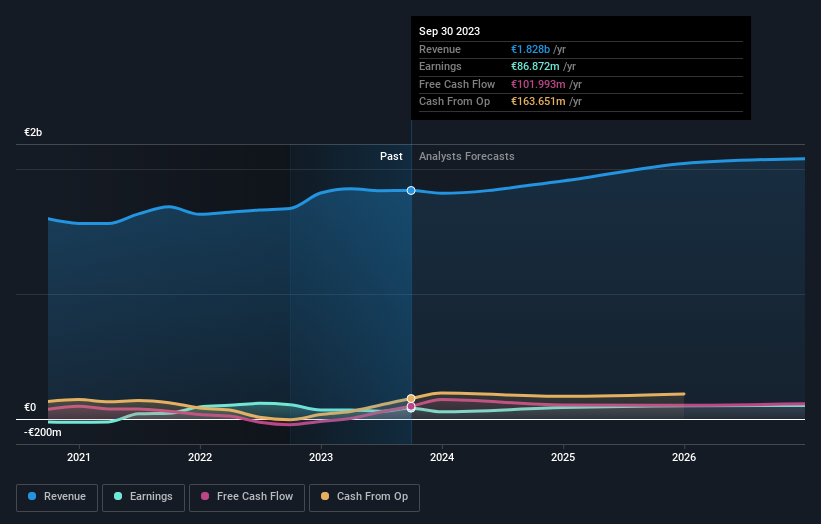- Germany
- /
- Industrials
- /
- XTRA:INH
INDUS Holding's (ETR:INH) earnings have declined over five years, contributing to shareholders 39% loss

INDUS Holding AG (ETR:INH) shareholders should be happy to see the share price up 11% in the last month. But that doesn't change the fact that the returns over the last five years have been less than pleasing. You would have done a lot better buying an index fund, since the stock has dropped 48% in that half decade.
While the stock has risen 10.0% in the past week but long term shareholders are still in the red, let's see what the fundamentals can tell us.
View our latest analysis for INDUS Holding
To quote Buffett, 'Ships will sail around the world but the Flat Earth Society will flourish. There will continue to be wide discrepancies between price and value in the marketplace...' One way to examine how market sentiment has changed over time is to look at the interaction between a company's share price and its earnings per share (EPS).
INDUS Holding became profitable within the last five years. That would generally be considered a positive, so we are surprised to see the share price is down. Other metrics might give us a better handle on how its value is changing over time.
In contrast to the share price, revenue has actually increased by 0.7% a year in the five year period. So it seems one might have to take closer look at the fundamentals to understand why the share price languishes. After all, there may be an opportunity.
The company's revenue and earnings (over time) are depicted in the image below (click to see the exact numbers).

We know that INDUS Holding has improved its bottom line over the last three years, but what does the future have in store? Take a more thorough look at INDUS Holding's financial health with this free report on its balance sheet.
What About Dividends?
When looking at investment returns, it is important to consider the difference between total shareholder return (TSR) and share price return. Whereas the share price return only reflects the change in the share price, the TSR includes the value of dividends (assuming they were reinvested) and the benefit of any discounted capital raising or spin-off. Arguably, the TSR gives a more comprehensive picture of the return generated by a stock. As it happens, INDUS Holding's TSR for the last 5 years was -39%, which exceeds the share price return mentioned earlier. This is largely a result of its dividend payments!
A Different Perspective
INDUS Holding shareholders have received returns of 8.9% over twelve months (even including dividends), which isn't far from the general market return. The silver lining is that the share price is up in the short term, which flies in the face of the annualised loss of 7% over the last five years. While 'turnarounds seldom turn' there are green shoots for INDUS Holding. It's always interesting to track share price performance over the longer term. But to understand INDUS Holding better, we need to consider many other factors. For instance, we've identified 2 warning signs for INDUS Holding that you should be aware of.
If you like to buy stocks alongside management, then you might just love this free list of companies. (Hint: insiders have been buying them).
Please note, the market returns quoted in this article reflect the market weighted average returns of stocks that currently trade on German exchanges.
New: AI Stock Screener & Alerts
Our new AI Stock Screener scans the market every day to uncover opportunities.
• Dividend Powerhouses (3%+ Yield)
• Undervalued Small Caps with Insider Buying
• High growth Tech and AI Companies
Or build your own from over 50 metrics.
Have feedback on this article? Concerned about the content? Get in touch with us directly. Alternatively, email editorial-team (at) simplywallst.com.
This article by Simply Wall St is general in nature. We provide commentary based on historical data and analyst forecasts only using an unbiased methodology and our articles are not intended to be financial advice. It does not constitute a recommendation to buy or sell any stock, and does not take account of your objectives, or your financial situation. We aim to bring you long-term focused analysis driven by fundamental data. Note that our analysis may not factor in the latest price-sensitive company announcements or qualitative material. Simply Wall St has no position in any stocks mentioned.
About XTRA:INH
INDUS Holding
A private equity firm specializing in mergers and acquisitions and corporate spin-offs.
Very undervalued established dividend payer.
Similar Companies
Market Insights
Community Narratives




